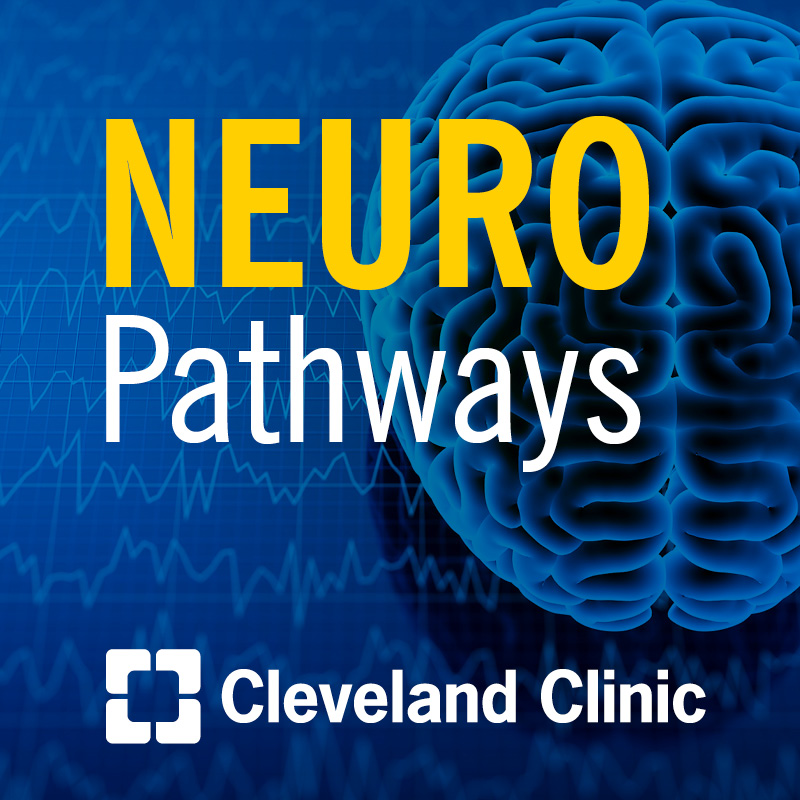Use of Artificial intelligence in Spine Surgery Decision Making

Join Tom Mroz, MD, as he discusses the use of artificial intelligence and its redefining role in value-based spine care.
Subscribe: Apple Podcasts | Spotify | Buzzsprout
Use of Artificial intelligence in Spine Surgery Decision Making
Podcast Transcript
Dr. Alex Rae-Grant: Neuro Pathways, a Cleveland Clinic podcast for medical professionals exploring the latest research discoveries and clinical advances in the fields of neurology and neurosurgery. Welcome to another episode of Neuro Pathways. I'm your host Alex Rae-Grant neurologist in Cleveland Clinic's Neurological Institute. In an effort to explore the latest advances in neurological practice, today we're talking with Dr. Tom Mroz about his team's use of artificial intelligence in the spine surgery decision making process. Dr. Mroz is director of the Center for Spine Health and an orthopedic surgeon in Cleveland Clinic's Neurological Institute. Tom, welcome to Neuro Pathways.
Dr. Tom Mroz: Thank you. It's a pleasure to be here.
Dr. Alex Rae-Grant: Before we get started, tell us a little bit about yourself, where you're from? Where did you train and when did you begin your career at Cleveland Clinic?
Dr. Tom Mroz: Well, I'm actually from Cleveland. I trained in medical school here and then I went to George Washington University in Washington, DC to do my orthopedic residency. Thereafter, I went to UCLA in Los Angeles to do my first spine fellowship. Then I worked with a neurosurgeon over at the University of Tennessee in Memphis to do a second fellowship in neurosurgery. And then I came here in 2004 and I've been here ever since.
Dr. Alex Rae-Grant: So for our listeners who may not work with spine patients, set the stage for us -what's the current state of spine surgery across the country?
Dr. Tom Mroz: Spinal pathologies make up a very large proportion of medical expenditures. We see a host of different types of patients ranging from the occipitocervical junction all the way down to the sacrum. And there's a whole host of different problems a spine can cause for a particular patient. With a large breadth of diseases that affect the spine, coupled to a large variety of different human beings. And then couple that with a large difference in providers from on the medical side and the surgical side.
Nationally, we see a pretty large heterogeneity in terms of how patients are treated non-operatively and operatively for a given pathology across the spectrum.
Dr. Alex Rae-Grant: Why are you shifting towards using artificial intelligence in your practice? What does that do for you?
Dr. Tom Mroz: Sure. We've learned over time that there are many variables that influence how a patient perceives their outcomes at a variety of different time points after surgery or after a non-operative care. For example, injections or medications that are used to treat a specific problem. And what we have found when we've dived into it a little bit deeper, we've been very successful in identifying specific variables that influences such as working status or previous surgeries, et cetera, et cetera. But what we are bad at is reconciling all the discrete data points that are known to influence a patient's perception of their outcome.
But we're also not very good at recognizing those things that haven't been recognized in the peer reviewed medical literature as influencers or variables that have anything to do with the patient's outcome. And so we are investigating and I think we're going to be successful in leveraging existing technology and creating some of our own with machine learning to be able to reconcile in real time all the discrete data points in an electronic medical records, financial databases, but also patient reported outcomes to help us make more informed holistic decisions on whether or not a patient will or will not benefit from our idea of what that patient needs.
When we look at the opportunity for the American Board of Orthopedic Surgery and the American Board of Neurological Surgery, we think that we can refine the guidelines by which providers judge their own patients. And so I think we can dial in with greater accuracy on what will be the best treatment for a particular patient.
Dr. Alex Rae-Grant: What kind of data does your group collect when you see a patient in the spine center, then is it a systematic approach or?
Dr. Tom Mroz: Sure. Probably around 12 to 13 years ago we started using the knowledge program, which is a patient reported outcomes database that gives us pre and post treatment data on how a patient is doing. As an example, there are many validated outcome measures that we employ for the cervical spine and the lumbar spine. And every time a patient presents to us in clinic, they will have a tablet given to them in the clinical holding area. They'll fill out that tablet and then it'll get automatically synced into the electronic medical records. And then if we ended up doing surgery on that particular patient or end up implying a different medical treatment, we can over time see how they do relative to their pretreatment benchmarks.
And so that is just one data source or data repository that we're using for this machine learning software platform that will allow us to, I think make much, much more informed decisions.
Dr. Alex Rae-Grant: So the AI will help look at multiple data points from different sources and start to see if there's predictive models that you might not have anticipated clinically. Is that something like that?
Dr. Tom Mroz: Sure, sure. Ultimately we're trying to deliver on value based healthcare. And in 2019 there's a lot of talk about value based healthcare, but we live in a fee for service world and trying to come up with a platform or a method to really deliver on what's going to be cost effective and what's really going to be the best treatment for a particular patient, I think this probably is the way to go.
Dr. Alex Rae-Grant: So do you see this tool, once it's been completely validated, could it be something applied elsewhere?
Dr. Tom Mroz: Certainly, I think if we look at the heterogeneity that's known to exist in spine surgery across the country, this is something for large organizations, healthcare systems that I think would render a lot of opportunity, perhaps a lot of interest as well. Because I think even though there's a lot of heterogeneity, it's not because surgeons are just randomly assigning or picking surgical treatments for particular patient. It's just that it's such a complex field and that there are many variables that go into whether or not a patient's going to have a successful or unsuccessful outcome. As an example for one pathology in the spine, there may be five different surgeries that are used to treat that particular problem. And there are many, many, many different patient specific variables that some of which are modifiable, which is good, that have an influence on a patient's perception of how they do.
And finally, there's a lot of different variations in surgeons. Some of us are incentivized, some are not. Some come from different treatment backgrounds, some have had different experiences, some are more experienced than others, et cetera. So we've found over surveys that there are a lot of different variables just for surgeons that influence a patient's outcome.
Dr. Alex Rae-Grant: So it's interesting, it almost sounds like you're doing personalization of medicine, not just for the person with the condition, but for the clinician caring for them.
Dr. Tom Mroz: Absolutely. At the Cleveland Clinic we'll be able to validate everything we've done based upon historical performance. And I may find that I'm not the right person for a patient being seen for lumbar degenerative spondylosis. And there may be somebody in my group that historically has performed better. And then maybe if I can't re-medialize my own work, then that patient should be sent to the surgeon who performs better.
Dr. Alex Rae-Grant: Tom, thank you so much for joining us. It's really been a pleasure talking with you today.
Dr. Tom Mroz: Thank you very much.
Dr. Alex Rae-Grant: This concludes this episode of our Neuro Pathways Podcast. You can find additional podcast episodes on our website, Clevelandclinic.org/neuropodcast. Subscribe to the Neuro Pathways Podcasts on iTunes, Google play, Spotify, SoundCloud, or wherever you get your podcasts. And don't forget you can access real-time updates from experts in Cleveland Clinics Neurological Institute on our consult QD website, consultqd.clevelandclinic.org/neuro or follow us on Twitter @CleClinicMD all one word that's @C-L-E-ClinicMD on Twitter. Thank you for listening. Please join us again soon.

Neuro Pathways
A Cleveland Clinic podcast for medical professionals exploring the latest research discoveries and clinical advances in the fields of neurology, neurosurgery, neurorehab and psychiatry. Learn how the landscape for treating conditions of the brain, spine and nervous system is changing from experts in Cleveland Clinic's Neurological Institute.
These activities have been approved for AMA PRA Category 1 Credits™ and ANCC contact hours.
